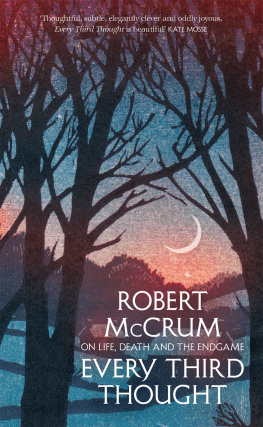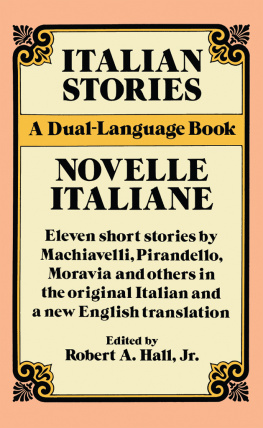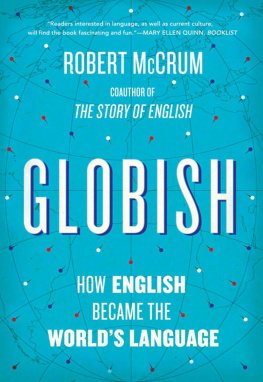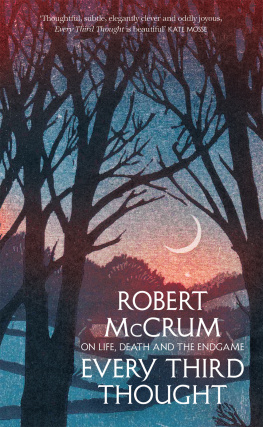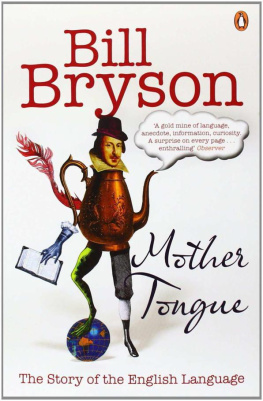Robert McCrum - Globish: How English Became the Worlds Language
Here you can read online Robert McCrum - Globish: How English Became the Worlds Language full text of the book (entire story) in english for free. Download pdf and epub, get meaning, cover and reviews about this ebook. year: 2010, publisher: Doubleday Canada, genre: Religion. Description of the work, (preface) as well as reviews are available. Best literature library LitArk.com created for fans of good reading and offers a wide selection of genres:
Romance novel
Science fiction
Adventure
Detective
Science
History
Home and family
Prose
Art
Politics
Computer
Non-fiction
Religion
Business
Children
Humor
Choose a favorite category and find really read worthwhile books. Enjoy immersion in the world of imagination, feel the emotions of the characters or learn something new for yourself, make an fascinating discovery.

- Book:Globish: How English Became the Worlds Language
- Author:
- Publisher:Doubleday Canada
- Genre:
- Year:2010
- Rating:3 / 5
- Favourites:Add to favourites
- Your mark:
- 60
- 1
- 2
- 3
- 4
- 5
Globish: How English Became the Worlds Language: summary, description and annotation
We offer to read an annotation, description, summary or preface (depends on what the author of the book "Globish: How English Became the Worlds Language" wrote himself). If you haven't found the necessary information about the book — write in the comments, we will try to find it.
Globish: How English Became the Worlds Language — read online for free the complete book (whole text) full work
Below is the text of the book, divided by pages. System saving the place of the last page read, allows you to conveniently read the book "Globish: How English Became the Worlds Language" online for free, without having to search again every time where you left off. Put a bookmark, and you can go to the page where you finished reading at any time.
Font size:
Interval:
Bookmark:
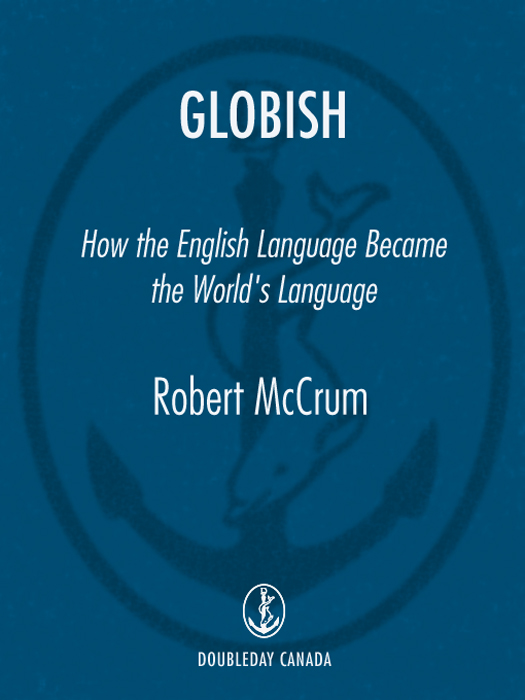
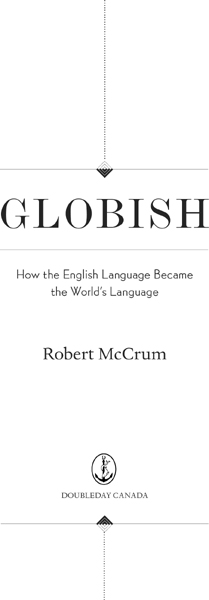
FICTION
In the Secret State
A Loss of Heart
The Fabulous Englishman
Mainland
The Psychological Moment
Suspicion
NON-FICTION
The Story of English (with William Cran and Robert MacNeil)
My Year Off
Wodehouse: A Life
For my mother,
Christine McCrum,
who gave me English:
with love and thanks.
For certainly our language now used varyeth far from that which was used and spoken when I was born. For we Englishmen have been born under the domination of the moon, which is never steadfast, but ever wavering and waxing one season.
WILLIAM CAXTON, PROLOGUE TO ENYDOS
In all pointed sentences, some degree of accuracy must be sacrificed to conciseness.
SAMUEL JOHNSON, THE BRAVERY OF THE COMMON ENGLISH SOLDIER
The English language is not an abstract construction of dictionary makers. It is the powerful language of resistance; it is the dialect of common sense. It is the speech of the proud and melancholy races and of all who aspire; it has its basis broad and low, close to the ground.
WALT WHITMAN, PREFACE TO LEAVES OF GRASS

CONTENTS
Crazy English

The twenty-first century has revealed a world more intertwined than at any time Will we stand for the human rights of the dissident in Burma, the blogger in Iran or the voter in Zimbabwe? Will we give meaning to the words never again in Darfur?
BARACK OBAMA, SPEAKING IN BERLIN, 24 JULY 2008
The Renmin University of China, also known as the Peoples University, in Beijing, has about 36,000 students, studying everything from politics to social anthropology. The university, one of several in the capital, is based to the north-west of the city, on Zhongguancan street in Haidian district. Its alumni are typical of the postMao Zedong generation. Every Friday evening, quite informally, several hundred gather in the so-called English Corner to hold English conversation. This extraordinary scene, reiterated on campuses across China today, is a popular routine that says a lot about the aspirations of contemporary Chinese and the state of the nation. This is, after all, an authoritarian, one-party regime in which dissent is ruthlessly crushed, and its enemies imprisoned, beaten up, or sent into exile. However, here in the twilight, on a cool March Friday, under the shady pine trees of a little square, there are hundreds of young Chinese in running shoes, jeans and puffa jackets chatting together, in English, about anything and everything, including asides about Tiananmen Square. I remember the Soviet Union before glasnost and perestroika in which the atmosphere was menacing and fearful; surveillance everywhere; and the state inflexibly vigilant. This feels different. Perhaps these Chinese have been cunningly infiltrated by informers, or perhaps everyone is exercising heroic self-censorship about the topics that matter, but the mood is unquenchably relaxed, friendly and inspired by a common purpose, which is to learn better English.
As a tall westerner, I stand out in this crowd like Gulliver, and it is not difficult to start up a conversation. When I begin with Im from London, about a dozen students crowd round at once. Everyones interested, theres a murmur of London across the group. One brave soul strikes up with Where in London? I explain that my home is near Notting Hill. Oh yes, they have all heard of Notting Hill. Now the conversation, initially a stilted Q & A, goes quickly forward: movies, film stars, Hollywood, America So then, I ask: Has anyone been to America or London? No, not yet; but they all seem to want to. I hand out Chinese business cards with an email address. We get onto the US presidential race. Hillary is a hard name for the locals to get their tongues round, but apart from a few stumbles, the level of conversation is remarkably high. The groups interest is really to ask about the UK, about soccer, Victoria Beckham, BBC television and so forth. Eventually, I move on to another circle, which is learning basic language skills by rote.
The instructor stands by a blackboard, as much like a bookie at a racetrack as a foreign language teacher, and reads out a line of English: Im sorry I misjudged you, Mr Prescott. The group repeats it: Im sorry I misjudged you, Mr Prescott. Someone hands me a flyer with some Chinese characters beneath the slogan Never Let Spoken English Become Your Limitation. The teacher intones another line: If you hate this job, why dont you quit? If you hate this job, repeats the group with the furrowed concentration of a prayer meeting, why dont you quit? Jobs arent that easy to come by, says the teacher. Jobs arent that easy to come by, repeats the class. Less than a conversation, this seems more like boot camp, but no ones complaining. They are here to join the English-speaking world, and will submit to whatever the global figure for English by more than two to one, and the marketing of Chinas quest for English suggests that even the Chinese recognize it as slightly eccentric. One of the more popular ways of learning English in China is through a course entitled Crazy English, where the emphasis is on learning to speak the language before writing it down: To shout loud, you learn. But the process is not as bizarre as one might think and the way that the English language has travelled and changed through time and space throws up many examples of contemporary craziness.
Globalization is a word that first slipped into its current usage during the 1960s; and the globalization of English, and English literature, law, money and values, is , before and after the credit crunch. Combined with the biggest IT innovations since Gutenberg, it continues to inspire the most comprehensive transformation of our society in five hundred, even a thousand years. This is a story I have followed, and contributed to, in a modest way, ever since I wrote the BBC and PBS television series The Story of English, with William Cran and Robert MacNeil, in the early 1980s. When Bill Gates was still an obscure Seattle software nerd, and the latest cool invention to transform international telephone lines was the fax, we believed we were providing a snapshot of the English language at the peak of its power and influence, a reflection of the Anglo-American hegemony. Naturally, we saw our efforts as ephemeral. Language and culture, we knew, are in flux. Any attempts to pin them down would be antiquarianism at best, doomed at worst. Besides, some of the experts we talked to believed that English, like Latin before it, was already showing signs of breaking up into mutually unintelligible variants. The Story of English might turn out to be a last hurrah.
We were, of course, dead wrong. The global power and influence of Anglo-American language and culture in the broadest sense was about to hit another new high. When the Cold War ended, after the Berlin Wall came down and once the internet took off in the 1990s, there was an astonishing new landscape to explore and describe. Sometimes to play a role among the Powers of the Earth derived, as they put it, from the Laws of Nature. The world had become a planet composed of some 193 countries, all enjoying a greater or lesser familiarity with English and Englishness. Was this the end of Babel?
Font size:
Interval:
Bookmark:
Similar books «Globish: How English Became the Worlds Language»
Look at similar books to Globish: How English Became the Worlds Language. We have selected literature similar in name and meaning in the hope of providing readers with more options to find new, interesting, not yet read works.
Discussion, reviews of the book Globish: How English Became the Worlds Language and just readers' own opinions. Leave your comments, write what you think about the work, its meaning or the main characters. Specify what exactly you liked and what you didn't like, and why you think so.

